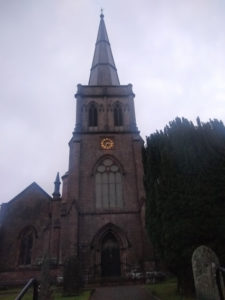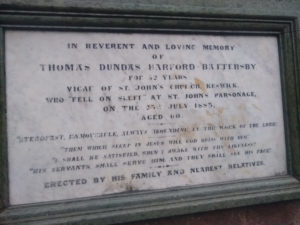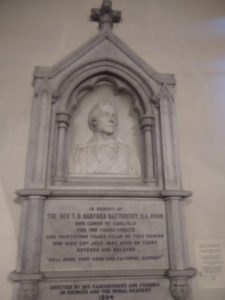Derwentwater, named after Lord Derwentwater, who was executed for treason, is a large lake in the English county of Cumbria, part of the Lake District National Park. On the northernmost tip of that lake is the small town of Keswick, a market town which name traces to the 13th century. In the 19th century it became popular for tourism and especially with the building of a trainline there from nearby Penrith.

Church of England in Keswick
In the late 1820s, William Wordsworth, the poet, encouraged John Marshall II, whose father and he earned a fortune in Leeds in the textile industry, to build a house near Keswick. Because Marshall saw a need, first he planned with the architect Anthony Salvin to erect a building for a Church of England parish there, named St. John’s the Evangelist, in the old English style. Frederic Myers, not to be confused with Frederick Meyer (early Keswick theology proponent), became the first vicar there in 1838, then in 1840 after the death of his first wife, married Susan, a daughter of John Marshall.



Shortly before Myers’s death, T. D. Hartford Battersby (biography with preface by H. C. G. Moule) came to join him, having read his theology (1841), which had persuaded him toward evangelicalism. Battersby, while attending and then graduating from Oxford, hungered for greater spirituality amidst confusion of the Anglo-Catholic Oxford Movement. In 1851 Battersby became second vicar of St. Johns and stayed there until 1883.


Something of great historical and theological significance occurred in Keswick on June 28, 1875 in a tent on the lawn of St. John’s. Under the leadership of Battersby, a prayer meeting began a convention there for a week, which spawned the Higher Life Movement in the United Kingdom, also called the Keswick Movement and the related Keswick Theology.
Trip to Keswick
The beautiful little town of Keswick makes a wonderful day trip of an hour and fifteen minutes by bus from Carlisle. In an entire day and early evening of pouring rain, my wife and I travelled with our umbrellas there Tuesday to look. We walked around the quaint town, first entering a shop of Lucy Pittaway, of whom I had never heard, but found she was three years running the most popular artist in the country. While my wife shopped, I began talking to the two ladies. Something like the following occurred:
Have you heard of the Keswick Movement?
They both nodded, no.
It started here. The Keswick Movement influenced now over 500 million people all over the world. It began here in the 19th century in this town. Do you know what it is?
They both nodded, no. One of them asked, “What is it?”
It is theological, I explained. It relates to the Bible. Do you know the Bible?
They both nodded, no.
Have you heard of the Old and New Testaments?
They both nodded, yes.
The New Testament starts with the first four gospels, Matthew, Mark, Luke, and John. Have you heard of those?
They both nodded, yes.
The gospels tell the story of Jesus. Part of what bothers people about the Bible is that Jesus did miracles. He is God. He healed everybody in Judea and Galilee. People want to know, if the Bible is true, why doesn’t that happen today? It’s not a bad question.
I explained the Keswick movement, second blessing theology, and moved into the gospel in a nutshell. They listened in complete rapt attention to everything I said there in that art shop.
Keswick Information Center
My wife and I walked down that cobble stone historical small downtown area and she went into a “bunny store.” Beatrix Potter was born in the lake district, so her books are all over there. We saw a whole section of Beatrix Potter products in the grocery store next to the bus stop. While she looked there, I went into a very old chapel in the middle of town that houses their Keswick information center. Tourists in Keswick today (and probably for centuries) mainly want to hike around the lake, which few to no one was doing in the pouring rain and ‘gale-force’ winds.
When I walked into the information center, it was one woman behind a desk. We greeted one other, she wondered why we were there. I asked if she heard of the Keswick movement. The conversation above happened again. She listened too with riveted attention. She was not religious, but she was so excited that she left from behind the desk to get a co-worker. I began explaining the same thing to him. This was seeming easy. Each time I brought in the gospel.
Walk to St. John’s
I went out in time for my wife to leave the bunny store and we kept walking up that main street. It went up a hill. The lake district is full of steep hills. Water runs down them and forms lakes. If you hike those hills, you get amazing views when it isn’t pouring down rain. My wife and I found St. John’s. I told her this is where the Keswick movement started. Even though the town heard and knew nothing about Keswick theology, I wanted to see if I found evidence for it in that old building.
Bridget and I opened a very old gate and took a path up some steps around the front of the edifice. Three men walked very quickly in front of us into the building in heavy rain gear. We took some pictures on the outside. We entered and walked around, while those three talked.
Two of the three men were trying to sell internet services to St. John’s. The other man was the present vicar, Charles, only the 13th since 1833. I had a long talk with him about Keswick theology, the Church of England, and the gospel, until an elderly man entered with whom he needed to meet. The Keswick Convention continues today, but doesn’t believe Keswick theology that still continues in various forms it introduced and propagated.
The theology from the first few decades of the Keswick Convention generated the Charismatic movement and a wide range of corruption in evangelicalism and through ecumenism. This includes many varieties of higher life and second blessing theology infiltrating fundamentalism and Baptists, including independent ones in the United States. The town itself and many surrounding communities today is mainly irreligious, non-religious, atheist, and in great need of the gospel.
Battersby
What engendered the spiritual hunger of Battersby in 1875? Why did he need more spiritually than what he already had?
Before conversion, everyone falls short of the glory of God. After justification by faith, no one does. Even of the church at Corinth, Paul wrote, “Ye come behind in no gift” (1 Corinthians 1:7). True believers have every spiritual blessing in Christ (Ephesians 1:3). Among saved people, there are not spiritual haves and spiritual have nots, only spiritual haves.
Believers do not need more Holy Spirit. The fulness of the Holy Spirit is not more Holy Spirit. Those who believe in Jesus Christ receive all the Holy Spirit. In fulness, the Holy Spirit has all of you, not your having more of Him.
The Church of England says that faith and repentance are necessary for the reception of the Sacraments of Baptism and the Eucharist, which are generally necessary to salvation. It says infant sprinkling people regenerates and makes members of Christ and children of God. Someone depending on more than Christ for salvation will not receive the Holy Spirit, so he will always hunger for spirituality. Anglicans like Battersby, sprinkled as infants, even if later confirmed, are not saved. Conversion comes by faith alone through grace alone.
Paul wrote that we are complete in Jesus Christ (Colossians 2:10). Baptism and the eucharist add works to grace, thereby Christ is made of no effect unto them (Galatians 5:4). The Church of England says that the bread and the drink of the eucharist preserve a soul unto everlasting life.
Everyone who trusts in more than Jesus Christ will hunger for spirituality that is a basis for seeking for a second blessing. It is not a second blessing they need, but a first. It isn’t higher life, but life itself. More spiritual experiences, especially invented, conjured, or manipulated ones, will not and cannot replace true salvation by faith in Jesus Christ alone.
Brother Kent,
I preached on Galatians 5:24, “They that are Christ’s have crucified the flesh” recently and I was discussing the crucified life and mentioned that all believers have been crucified with Christ. One man in the discussion said, “You’re speaking of positional crucifixion, but when someone fully surrenders that is when they actually live the crucified life.” I pushed back against the word positional because I’ve seen it used as a way to let men live in sin while claiming they’ve got the positional justification but they just aren’t living it.
I understand that we don’t always live out being dead to sin, but as I read Romans 6 it appears that being dead to sin is something very available to us because it is a reality, not some truth to be received when we fully surrender.
I say all that because I’ve been teaching our church recently that everything they need to live holy is available because of Christ and they only need to believe by faith that they have what they need instead of “trying harder to do right.”
Do you think my understanding is correct? Thanks.
Everything you wrote in that comment sounds right to me. We have a reality, an indicative, and because of that we have an imperative. Do this because of the reality you have. You can do it and you will do it because it is who you are since you’ve been saved, completed action, ongoing results. I don’t mind the word positional, but I see where you’re coming from, used as an excuse for not living it.
Dear David,
Thanks for the question. We do need to believe by faith that we have what we need, but we also need to try harder to do right. There is no contrast between the two. We are to resist unto blood, striving against sin.
You may find some of the material on Keswick at:
https://faithsaves.net/soteriology/
helpful.
Thanks.
Thank you. My point wasn’t to take out human responsibility. It seems to me there is a disconnect between what God expects and the fact that we can do it because of what Christ did. I’ve heard preaching that seems to imply “it’s all up to me.” Not that anyone would say that, but it’s there. I’ve seen it especially in revivalist type churches and groups. You’ve both written much on this so I won’t try to educate you about what is out there.
Maybe I just never listened, but it was only recently that I began to understand what was available to me in Christ. I didn’t hear much teaching and preaching on that growing up.
Thank you for the thought though. I don’t want to get into a ditch on either side of the truth and proper thinking.
BTW, here is specifically what is beneficial and harmful in Keswick theology:
https://faithsaves.net/keswick-theology/
Nice post!
Thanks.